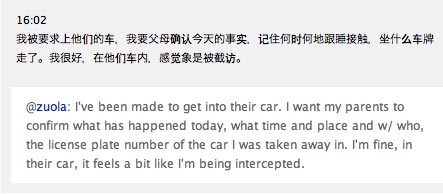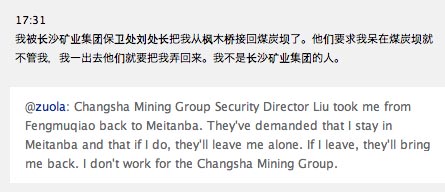Bloggers in the Middle East could help demystify the region and become a reliable source of ‘anti-news’, says Jerusalem-based journalist and documentary maker Jaron Gilinsky.
Tag Archives: journalist
Wires in a twist – why you should always check your news agency feeds
As we’ve blogged before, Nick Davies’ recent book, Flat Earth News, uses findings from a specially-commissioned team of researchers at Cardiff University to show national newspapers’ dependency on press agencies.
After an investigation of 2,207 domestic news articles and their sources over two random weeks, the research team reported that 60 per cent of ‘quality print-stories’ (carried by the Guardian, the Daily Telegraph, the Independent, the Daily Mail and the Times) came wholly or largely from a combination of PR releases and news agency copy.
The dangers of dependency on wire copy were illustrated on journalist Jo Wadsworth’s blog this morning: she describes how yesterday her site’s biggest hits and highest comments were on ‘several month-old stories about Premiership teams,’ which can be viewed here.
It looks like it was a technical error (she blames gremlins for playing havoc with the paper’s PA national football feeds), but it shows how manual checking on automatic feeds can never be replaced.
Baldy blogger’s posts published in charity book
Adrian Sudbury, the journalist-turned-blogger who sadly passed away this week, is to have his blog posts published in a book for charity.
Adrian, who chronicled his battle against leukaemia on Baldy’s Blog, set-up a campaign to make education about bone marrow donation compulsory in UK schools and colleges.
The volume will feature posts from the blog and a selection of comments from its readers, as well as photos of Adrian and a foreword by Gordon Brown, whom Adrian met as part of his campaign.
All proceeds from Baldy’s Book will go to leukaemia charity The Anthony Nolan Trust.
Innovations in Journalism: vtap – driving the ‘video-anywhere revolution’
In our Innovations in Journalism series, Journalism.co.uk asks website and technology developers to pitch their projects to us. This time it’s Veveo with vtap, its personalised video service for mobiles.

1) Who are you and what’s it all about?
We’re Veveo – founded in 2004 by a team of executives with a history in multimedia, networking and mobile technologies.
Veveo’s mission is to be a driving force behind the ‘video-anywhere revolution’. The company’s flagship product, vtap is the first significant proof of concept. It offers consumers an easy way to browse, discover, keep and share videos from any source on any imaginable topic on the mobile device(s) of their choosing.
vtap indexes videos from all over the internet, including user-generated content (YouTube, DailyMotion) and professional sources (BBC, CNN), as well as blogs and corporate websites.
Basically, anywhere that video appears on the internet vtap indexes it and it is searchable for users.
To set up a personalised feed, users have to register (which is a simple process requiring only an email address and password).
They then enter search terms, which will bring up results or topics. These ‘topics’ can then be added to a feed, which allows users to log in and view relevant content at any time. This can also be viewed on their mobile phone.
By each video there is a ‘share’ button which enables users to send the video to another user, they just need to know the other person’s user name.
2) Why would this be useful to a journalist?
vtap is a great way to keep up-to-date with news and current events in an easy-to-view format. Because content is pushed to you on any device, you can keep up-to-date wherever you are.
3) Is this it, or is there more to come?
vtap is under constant development by our research and development team in Bangalore so there will be additional features in the near future.
We’re also working with mobile operators, mobile manufacturers, TV providers, consumer electronics manufacturers and content creators to deploy vtap solutions.
4) Why are you doing this?
Veveo believes that video content is the easiest way to get the content you want on a mobile, whether that’s news or entertainment.
To do this Veveo believes that users should be able to easily search videos from all over the web, and save and share what they find to create a personal TV channel.
This level of personalised service enables consumers to access the most relevant video content wherever they are, on any device.
5) What does it cost to use it?
vtap is a free service.
6) How will you make it pay?
vtap will be funded by an advertising model, details of which are yet to be announced.
Online Journalism Scandinavia: Norway’s Journalisten – a role model for UK journalism trade titles?
Kristine Lowe asks, is there a business model in covering the media for the media?:
(Disclaimer: Kristine works part-time for the Norwegian journalism magazine and website Journalisten and has previously contributed to Press Gazette and NA24 Propaganda)
Recording the miserable state of our industry, and listening to experts predicting its imminent death, is a daily plight for media hacks in the western hemisphere.
Newspaper readership for one seems to be in perpetual decline, a fact often bemoaned by the media columnist.
However, a recent article in MediaGuardian by former Press Gazette editor Ian Reeves suggests that the UK’s journalism trade titles, such as the National Union of Journalists’ (NUJ) The Journalist magazine and Press Gazette, are faced with an audience of hacks, who have lost the appetite for news about their own.
“You’ll never make money out of journalists,” Reeves quotes Haymarket’s Michael Heseltine as saying.
Yet that is exactly what the Norwegian equivalent of The Journalist does.
Journalisten.no recorded £1.4 million in revenues in 2007, despite competition from Kampanje (Campaign) – a trade magazine that also covers PR and marketing; NA24 Propaganda – a dedicated media news site; and the media sections of national and regional newspapers.
Roughly £800,000 of this came from advertising and £300,000 from subscriptions, leaving the magazine and news site, which are published by The Norwegian Union of Journalists (NJ), with a post-tax profit of £104,000.
Hardly enough for the hardened business world, but more than enough to justify the existence and further expansion of a ‘local newspaper’ for the country’s journalists.
The news site had 11,000 unique Norwegian-based visitors last week, while the main benefactors of the bi-weekly magazine are around 10,000 union members, who receive it as part of their union membership.
Other than union members, the magazine does have about 1,000 subscribers in the corporate and NGO sector, but not much has been done to market it to a broader audience recently.
The key to Journalisten’s revenues has been capturing the job classifieds market for media jobs, which is easier said than done in a more fragmented market such as the UK. Another minor stream of revenue for Journalisten is a database of PR contacts.
But Journalisten is hardly an isolated example: US-based media site Mediabistro, which also earns money from freelance listings, membership fees and training, must have had a decent turnover to have made it a worthwhile acquisition for Jupiter Media.
Swedish Résumé, owned by Swedish media giant Bonnier, is another contender with 15,000 unique visitors per day online and 29,000 readers per week for its magazine.
These are just two examples which spring to mind here and now, does anybody have other suggestions?
Journalism in Africa: Kenyan radio stations criticised in human rights report
Dennis Itumbi reports from Kenya for Journalism.co.uk on developments in the country’s media:
Three independent Kenyan radio stations have been named and shamed for fueling the post-election violence in the country last year in a human rights report.
The preliminary report ‘A Human Rights Account of Kenya’s Post-2007 Election Violence’, compiled by the government-funded but independent Kenya National Human Rights Commission, claims individual journalists and the radio stations incited and urged listeners to arm themselves and attack members of rival communities.
KASS FM, which broadcasts in the Kalenjin area, was accused by the report of ‘being highly biased and using inflammatory language in its broadcasts and programming.’
The report quotes one of its top journalists telling his audience in Swahili (a widely spoken dialect in East Africa)’ tokeni vita imetokea’, which loosely translates to ‘leave your houses, war has begun’. According to further notes in the report, the journalist went on to urge youths to ‘arm themselves’.
A preacher at the station – identified only as Rev Kosgey – is also named in the report for organizing a meeting to evict members of President Mwai Kibaki’s Kikuyu tribe from the Rift Valley region long before the elections.
Other stations mentioned include Inooro, owned by Royal Media Services – a high-flying independent media company, which owns the bulk of vernacular stations in the country, and religious broadcaster Radio Injili, based in Eldoret. Inooro was particularly blamed for organising revenge attacks in Kenya’s central province.
The report argued that the ‘media failed in the announcement of results, since they aired reports without a background context and historical voting patterns’.
The report comes at a time when the Kenyan media is sharply in focus over its role in the 2007 elections.
The pressure is so high that a commission has been set up to investigate the media’s coverage of the disputed presidential election results.
Journalism in Africa: Kenyan government seeks guidelines on anonymous sources
Dennis Itumbi reports for Journalism.co.uk from Nairobi on the media scene in Kenya:
The Kenyan government is urging the local press to develop a set of standardised rules for using anonymous sources.
Government spokesman Dr Alfred Mutua told a weekly press briefing that the state was concerned about ‘a new pattern of untrue stories that are on the increase and which solely depend on anonymous sources’.
Journalists at the televised briefing put the spokesman on the spot over the government’s reluctance to pass a proposed Freedom of Information bill and replace the current Official Secrets Act – a retrogressive set of laws that criminalise access and publication of basic information by branding all government documents confidential.
“You cannot accuse the media of being lazy and irresponsible, while they labour to get information that is hidden under the excuse of the Official Secrets Act. Kindly update us on how far the Freedom of Information bill has gone, given that it has been pending in parliament for the last nine years,” one journalist said.
“We agree that the time has come to free information, but the fact that we have not brought in the new law is no excuse to use sources who have little description or authenticity. We must stop that pattern for the sake of truth,” answered Mutua.
Last year Kenyan journalists took to the streets with their mouths gagged to protest against new laws by the government that would have seen the media forced to disclose their sources.
Chinese citizen journalist Zhou ‘Zuola’ Shuguang twitters his detention
Chinese citizen journalist Zhou ‘Zuola’ Shuguang has used microblogging service Twitter as he was detained by officials, Global Voices Online (GVO) has reported.
Zuola, who has used his blog to publish his own investigations into incidents such as the recent Chinese earthquake and the cover-up of a teenager’s murder, recently purchased a Blackberry and has been sending updates with the device to the Twitterberry service.
According to translations of his tweets by GVO, Zuola was forced to leave his parents house in a car by officials from the Meitanba Mining Group:

Zuola has since reported that he is under ‘town arrest’ and cannot leave the town of Meitanba:

Video: ITV correspondent John Ray arrested covering Beijing Olympics
ITV correspondent John Ray has been arrested by officials in Beijing, Reporters Without Borders (RSF) reports.
Ray was covering a pro-Tibet protest near the main Olympic site and was arrested despite identifying himself as a journalist.
The YouTube video below shows Ray in a police van reasoning with police officers before being driven away.
The camera still rolling, Ray repeatedly shouts ‘I’m a journalist’. “This is press freedom,” he says.
Journalism in Africa: New media laws force journalists to pay ‘registration fees’
Dennis Itumbi reports for Journalism.co.uk from Nairobi:
New media laws are threatening confrontation between Kenyan journalists and the government’s self-appointed media regulator, the Media Council.
Under the laws, which were passed despite protests by Kenyan journalists late last year, journalists in the country have to register for accreditation with the Media council.
Journalists must pay a compulsory sum of 2,000 Kenyan Shillings (£15.87) to register, regardless of whether they have registered in the past.
Those who fail to pay face imprisonment.
Foreign journalists are required to pay 10,000 Kenyan Shillings (£79.48) per month, while those working for less than three months will pay 5,000 Kenyan Shillings (£39.73) per month.
A letter from Kenya’s Media Council sent to all media owners said journalists would have to seek accreditation on an annual basis – a move seen as retrogressive by media groups.
Owners are also challenging the legislation, as it states that media houses must pay 20,000 Kenyan Shillings (£158.73) every month to fund ‘self-regulation’.
“[Y]ou have two months to comply or face the risk of deregistration,” it reads.
Eric Orina, secretary general of the Kenya Union of Journalists (KUJ), warned the move by the government would not be taken lightly. The organization would mobilize journalists to the streets to force the withdrawal of the fees demanded, he said.
“Self-regulation is the spirit of the laws and while we support accreditation of journalists we cannot allow the government through the Media Council to decide who practices journalism and who does not,” explained Orina, whose sentiments were echoed by Martin Gitau, chair of the Journalist Association of Kenya.
The Media Council has said it is merely implementing the existing Media Act 2007 and should not be blamed.
“We are a product of negotiation between the media and the government and since we have a legal mandate we have to implement it,” Wachira Waruru, chairman of the Media Council, maintained.
Elias Mbau, the journalist who helped organise demonstrations over another controversial clause in the act that would force journalists to disclose their sources, warned that the move to charge fees on a yearly basis would not be easily accepted.
“Nurses, engineers and lawyers are accepted into practice once; why should we renew accreditation as if it is membership to a club or a professional body?” said Mbau.